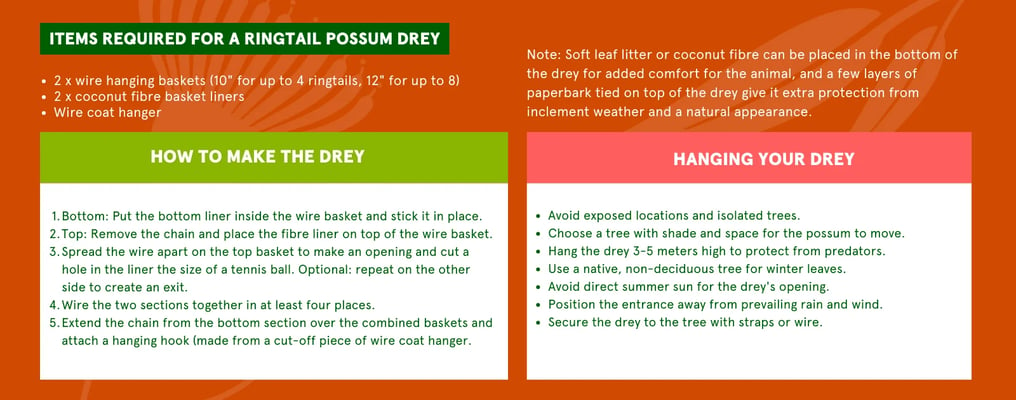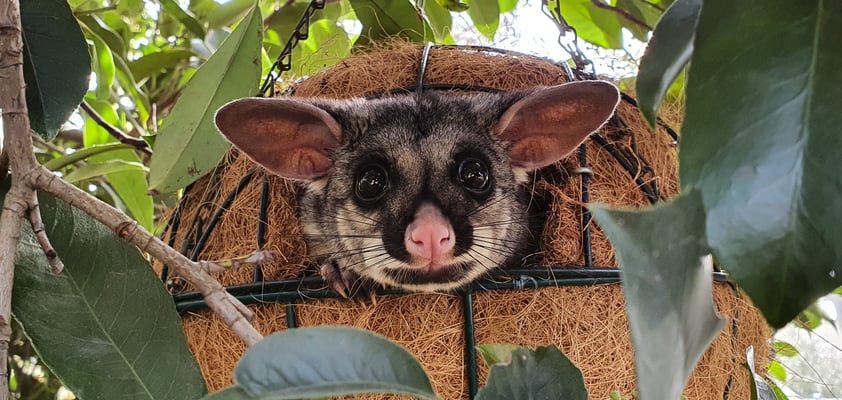POssums
A Peek into the Nocturnal Life
One of the most fascinating aspects of these possums is their nocturnal nature. They're creatures of the night, expertly navigating their surroundings in the dark. During daylight hours, they prefer to stay hidden and avoid prying eyes.
If you ever find a possum out and about during the day, there's a good chance something's amiss. It might be sick, injured, or orphaned, please call WIRES Rescue Line on 1300 094 737 or fill in the Rescue Form.
Ringtail Possums: The Smaller Marvels
Ringtail possums stand out among these captivating creatures with their petite size and distinctive white tail tips. But what's truly remarkable is their reproductive habits. Ringtail possums often produce twins and occasionally even triplets. If you encounter an orphaned baby Ringtail, don't forget to look for others in need. You might save an entire family of possums.
Ensuring Their Well-being
Caring for an injured or sick possum involves a few essential steps. First and foremost, the animal will require veterinary attention. To safely transport the possum to a vet, provide a quiet, dark, and warm environment, such as wrapping it in a towel and placing it in a ventilated box with a lid. It's crucial to ensure their comfort during the journey.
When dealing with possums, safety is paramount. Dress appropriately by wearing a jacket or long sleeves to minimise the risk of scratches. Additionally, don gloves and a face mask when handling the animal. Gently cover the possum with a towel, secure it in a ventilated box with a lid, and transport it carefully. After the mission, remember to practice good hygiene by washing your hands or using hand sanitiser.
Closing the Loop
When you inform WIRES about the possum's location, you play a vital role in their recovery. We follow up directly with the vet to bring it into care after it's been vet assessed and received any necessary treatment. It's a collective effort that can lead to a heartwarming success story.
Have a Possum in your Roof?
Possums are protected native animals. Due to habitat loss, possums sometimes live in chimneys and the roof cavities of sheds and houses. WIRES volunteers cannot assist with roof repairs and relocation. You will need the help of a licensed professional. Read our TIPS for helping possums find a safe home.
WIRES can provide information to help you comply with National Parks and Wildlife regulations. Read more here: How to remove a possum from your roof
Becoming a Possum Protector
The challenges these possums face, such as habitat loss and urbanisation, make it crucial for us to step in as protectors of their well-being. There are numerous ways to support possum conservation, from providing artificial homes to taking action for their habitat preservation.
Creating artificial dreys for Ringtail possums can be both educational and rewarding. You can build a cozy haven for them using wire hanging baskets, coconut fibre liners, and your imagination.
These artificial homes closely mimic natural dreys and provide possums with the shelter they need. Download the PDF with instructions and tips here.


Brushtail Possums
Providing alternative homes for possums via possum boxes can also greatly assist. You can buy nesting boxes or build your own, which Brushtail possums favour. You should locate a suitable tree in your backyard and fix the box at least four metres above the ground.
Click here for building instructions.Protect, Preserve, and Enjoy
As you explore the world of Brushtail and Ringtail possums, you'll become an observer and an active protector of Australia's unique and remarkable wildlife. Every action you take can significantly impact the lives of these charming creatures.
Report a Rescue
For wildlife rescue assistance, please call 1300 094 737 or fill in the Report a Rescue form. All other forms of contact including Facebook are not monitored for rescues.